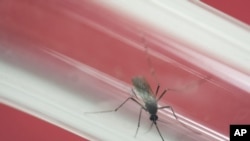The Zika virus, which U.S. health officials have determined threaten fetal brain development, also could pose risks to adult brains – and not just those of infected pregnant women.
New research, published in the journal Cell Stem Cell on Thursday, suggests the virus may damage cells that affect adults’ memory and learning.
In experiments with mice, researchers at New York’s Rockefeller University and California’s La Jolla Institute for Allergy and Immunology focused on neural progenitor cells. These cells, developing early in gestation, eventually specialize and become neural cells. "With the capability to replenish the brain’s neurons throughout its lifetime, these are the stem cells of the brain," the university explained in a news release on the findings.
It’s thought that Zika attacks a fetus’ progenitor cells; the death of such cells stunts brain development and growth. A small head is the hallmark of microcephaly, among the possible brain defects. The U.S. Centers for Disease Control and Prevention warned this spring that the mosquito-borne virus "is a cause of microcephaly and other severe fetal brain defects."
Scientists believe progenitor cells in adults have developed some resistance to Zika. That explains why most infected adults exhibit few signs – and those who do generally have only brief, mild flu-like symptoms.
Adults’ fully developed brains have only niches of progenitor cells, including in the hippocampus, the center of learning and memory.
Like baby, like parent
The researchers had a hunch that if Zika affects the brains of developing infants, it also could affect adults. They tested their theory on mice whose brains had been engineered to mimic Zika infection in humans. In mice, progenitor cells concentrate in two areas of the brain. Researchers found that more cells in those areas were dying and fewer cells were being regenerated.
"It was very clear that the virus wasn't affecting the whole brain evenly," said Joseph Gleeson, who leads Rockefeller’s Laboratory of Pediatric Brain Research. "In the adult, it's only these two populations that are very specific to the stem cells that are affected by virus."
Sujan Shresta, a La Jolla professor, said the research suggests Zika is causing greater harm than previously thought. The complex disease is “catastrophic for early brain development,” she said, “yet the majority of adults who are infected with Zika rarely show detectable symptoms. Its effect on the adult brain may be more subtle, and now we know what to look for."
More research needed
Gleeson said that while most adults seem able to overcome Zika’s effects, people with compromised immune systems could be more vulnerable. "In more subtle cases, the virus could theoretically impact long-term memory or risk of depression," he said.
The Zika virus also has been linked to the rare Guillain-Barré syndrome, an autoimmune disorder of the nervous system. It can cause temporary paralysis in children and adults.
Dr. Daniel Pastula, a neurologist and medical epidemiologist at the University of Colorado Denver, was more guarded about the study’s findings. "It's really unclear if this translates to human Zika infections," he told the Reuters news service.
And, if so, how long does the effect persist?
Gleeson said the study would need to be replicated as part of ongoing Zika research.
Reuters news service contributed to this report.





